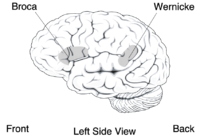
Photo from wikipedia
Purpose The purpose of this study was to generate a theory grounded in data explaining caregivers' understanding of their child's language disorder and the perceived role of speech-language pathologists in… Click to show full abstract
Purpose The purpose of this study was to generate a theory grounded in data explaining caregivers' understanding of their child's language disorder and the perceived role of speech-language pathologists in facilitating this knowledge. Method This study employed grounded theory as a conceptual framework. Qualitative data were generated based on semistructured interviews conducted with 12 mothers of children who had received speech-language pathology services. Results The following themes emerged from the data analysis: (a) Many mothers reported receiving confusing or irrelevant diagnostic terms for language disorder, (b) mothers of children with language disorders were distressed about their children's language problems, (c) mothers did not always trust or understand their children's speech-language pathologist, and (d) mothers were satisfied with the interventions their child had been receiving. Mothers described their children's language disorder using a total of 23 labels, most of which were not useful for accessing meaningful information about the nature of their child's communication problem. Generally, mothers reported they did not receive language-related diagnostic labels from speech-language pathologists for their child's language disorder. Conclusions Two theories were generated from the results: (a) Lack of information provided to mothers about their child's language disorder causes mothers psychological harm that appears to be long lasting. (b) Difficulties in successfully relaying information about language disorders to parents result in negative perceptions of speech-language pathology. Implications and future directions are discussed. Supplemental Material https://doi.org/10.23641/asha.12177390.
Journal Title: American journal of speech-language pathology
Year Published: 2020
Link to full text (if available)
Share on Social Media: Sign Up to like & get
recommendations!